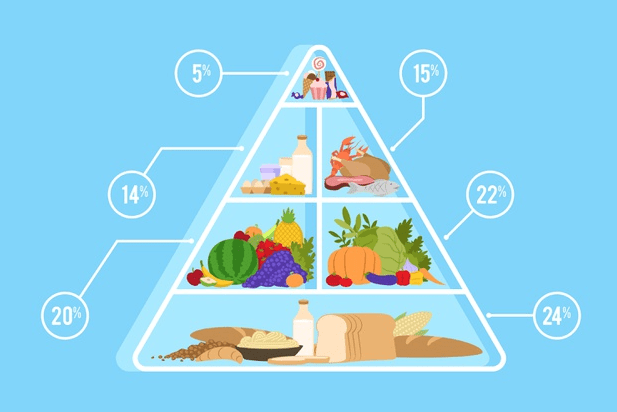Balanced Nutrition 101:
Your Ultimate Guide to a Healthy Diet
Balanced Nutrition 101:
YOUR ULTIMATE GUIDE TO HEALTHY DIET
- What’s your idea of a Balanced Diet?
- Why is it important to know that?
When the author was conducting a research study for her dissertation in post-graduation, she found out that almost 56% of the participants did not know the concept of Balanced Diet, and remaining had a vague stereotypical idea which was partially correct but not coherent
So, let’s understand what exactly is a balanced diet!

According to Indian Council of Medical Research (ICMR), a diet that contains different kinds of food which provide all the nutrients in required amounts is balanced. Here, the keywords are NUTRIENTS and REQUIRED AMOUNTS.
Now, this brings us to another question “What is my Requirement?”. This will totally depend on your age, gender, physical activity levels, physiological or body needs as per the current disease condition of the body etc. From this, we can understand that, though Balanced Diet is a general concept, it changes from person to person. It is way beyond and precise when it comes to the actual meaning of a balanced diet. To make this easy for understanding we have something called a food pyramid, which guides us on the kind of foods to be consumed and the quantity for ensuring balanced diet
consumption.
NUTRIENTS
Whichever foods we eat, they are made up of and going to be broken down to nutrients like Carbohydrates, Proteins, Fats, Vitamins, Minerals and Water. Some foods also contain Phytochemicals, Dietary Fibres and Antioxidants have innumerable protective health benefits and are present with the nutrients in healthy food.
CARBOHYDRATE
Carbs are often labelled as a harmful nutrient for health, but the fact is around 60% of our total calories come from carbohydrate. They are the base of our Indian Traditional diet, because it is required in that much proportion for various body functions. Fads like low carb diet and gluten-free diet for weight loss have got popularity because in such diets we cut down the maximum carb’s sources (major caloric contributor) and hence the caloric deficit leads to the weight loss. But is it a healthy way to lose weight? (Well, the answer to this question will be discussed in future blogs). Foods like Roti, Rice, Bread, Breakfast cereal, Poha and other cereal and millet-based products form the major source of carbohydrate. Fruits, Starchy vegetables and Sugar also rich in carbohydrate. Remember one thing, the more the processing is given to the carb-rich foods, harmful it gets. So, the real villain is Processed foods. Whole grain flours, fruits, vegetables are all healthy source of carbohydrate. However, products made of refined flour, fruit juices, fruit jams and jellies are few examples of unhealthy sources of carbohydrate and unfortunately, they top the list of our favourite foods. Fibre is also a type of carbohydrate, but human bodies lack the enzymes to digest them hence they are considered as roughage which helps in maintaining proper bowel movements and maintain healthy gut bacteria. Vegetables and fruits contain vitamins, minerals, phytochemicals and antioxidants which help build up our immunity.
“PROTEIN IS THE BUILDING BLOCK OF LIFE”
This statement you must have read in the school’s science textbook. Because head to toe we are made of protein. From the tiny DNA to the largest organ of the body (Skin) are all made up of protein. Hence, we cannot deny the fact that protein is a very important nutrient. Though it contributes to only 15-20% of energy in the diet, protein is primarily not meant to provide energy to the body. Without protein, it's difficult to have proper growth, development, maintenance and repair of the body. Pulses, lentils, dals, bean vegetables, nuts are a good source of protein, which also provide us with healthy carbs like fibre and healthy fats (read the next section of fats). Other sources include milk and milk products, eggs and other animal source foods which are rich in protein, calcium, vitamin D etc.
FAT
Fats are also considered devils as they provide the maximum number of calories in minimum proportion. But it’s the most favourite of those who do not care about health. Of course, oil, butter, cheese, ghee enhance the flavour of the food and it does help absorb some of the nutrients in the body. Hence consuming in small amount is not harmful. But the problem arises when people forget their limits and consume deep-fried, extra cheese, butter on regular basis. Apart from this, certain essential fatty acids are required to be consumed as we cannot produce them in the body. Nuts, oilseeds, fish, milk are some of the hidden sources of dietary fats and essential fatty acids. So, use the fats smartly in your diet to avoid over intake but still managing to eat the required essential fats.
WATER
Well, yeah! Water is also a nutrient and the most essential one. Living without water is impossible. 60-70% of the human body is made of water, each and cellular process requires water. Fresh looking skin, healthy hair, regular detoxification of the body are all possible because of proper water intake. So, make sure to stay hydrated. In conclusion, a balanced diet is very much needed to stay healthy, fit and fine. And the good news is, it’s easy to follow for a lifetime, unlike fad diets where you get bored in few days, go back to binging and feel weight loss is not my cup of tea. Stay away from unhealthy fads diets. Verify the source of the information.
